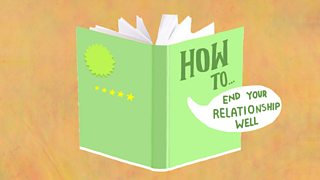How to ditch the shame
The feeling of shame can cause a lot of distress, but many of us carry it around with us for years. As part of our How To series, looking at some of life’s big challenges, Woman’s Hour has been exploring how we can banish shame from our lives.
Comedian Grace Campbell examines the shame she grew up with in her new book Amazing Disgrace, from feeling shameful about sex, rejection and jealous tendencies to her mental health. She and psychotherapist Gabrielle Rifkind both shared their best advice for ditching the shame…

1. Acknowledge it
“It’s probably one of the least talked about and yet one of the most powerful emotions,” says Gabrielle Riffkind. “It’s like an overwhelming sense of self-consciousness, of badness, of feeling unworthy. You could almost say it’s as if our body is blushing with embarrassment or disgrace. It’s the deepest of feelings. We’ve done something we shouldn’t have done and we feel a mixture of regret, a need to cover up, to hide.
“It becomes so secret, too shameful, to talk about. So what we then do is we withdraw deep into ourselves and it turns in on us and can lead to self-abuse, drug abuse, panic attacks, even suicidal thoughts.”
2. Bring your shame overground
“Change shame from being secret and underground to finding ways of communicating by talking to friends, family and those you are close to,” says Gabrielle. “It’s all in the realm of the ordinary and we want to normalise it so it doesn’t actually go underground and become shameful. It becomes an area that is pleasurable, that’s part of who you are, that’s not humiliating.”
“When we were growing up there was a lot of shame thrust upon us,” adds Grace Campbell. “For example, when I was quite a young child I started masturbating and I was so deeply ashamed of that because nobody had told me it was a normal thing for a girl to do. Not a single person until I was 21 years old legitimised this thing that I’d been doing on my own. So I was deeply ashamed of that.
“We all projected that shame onto each other. So while we were all doing it, no-one at school, no-one in our families, no-one in culture had said to us ‘that’s a normal thing that girls do as well’. We knew boys did it - everyone knew boys did it because boys spoke about it all the time.”

3. Talk about what you’re feeling
“In the book I talk about my shame around how awful I feel when I experience rejection,” says Grace. “This is something that I don’t think I should feel ashamed of because rejection is something that we go through in life. It’s just a really normal part of life - rejection in work, rejection in relationships, rejection in friendship. It happens and it’s never a nice experience.
“But it used to make me feel like a complete and utter failure. Shame can make you feel unlovable and I was so ashamed of how much I would get rejected, by men in particular, that it made me feel completely unlovable and like no-one would ever love me.
“So talk out loud about your shame. Admit that sometimes when you get rejected, you cry. And then you need to get so drunk you wet the bed… or maybe that’s just me!”
“If you are not ready to talk about shame or do not know how, see a therapist,” advises Gabrielle. “They will provide a safe space to find a language to help you prepare and then you can talk better to those you are close to.”
4. Befriend those emotions
“Everybody does different things with it,” says Gabrielle. “If you can find irony and humour and befriend these emotions they will no longer feel so scary and unsettling. This way shame can become a normal part of the rich tapestry of life and something we no longer have to hide. What Grace is doing in her book is it’s very ballsy, it’s very direct.”
“I overshare in the hope that young women in particular will bring a lot of this stuff from underground and talk about it in a completely normal ‘dinnertime conversation’ way,” adds Grace.
You can listen back to the discussion on 主播大秀 Sounds where you'll also find every episode of Woman's Hour you may have missed.
Follow us on or




